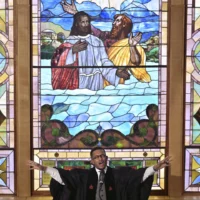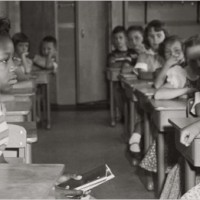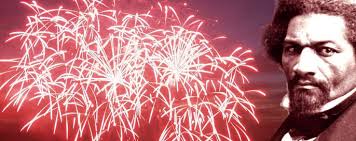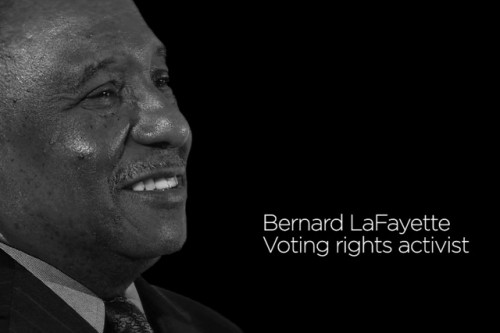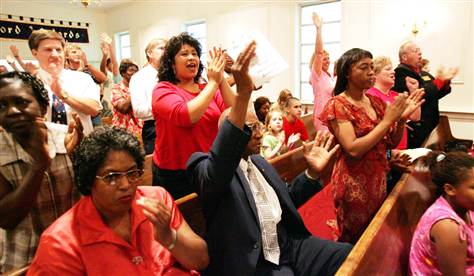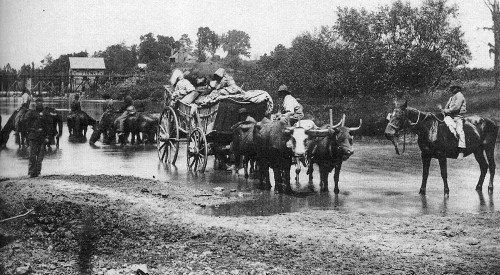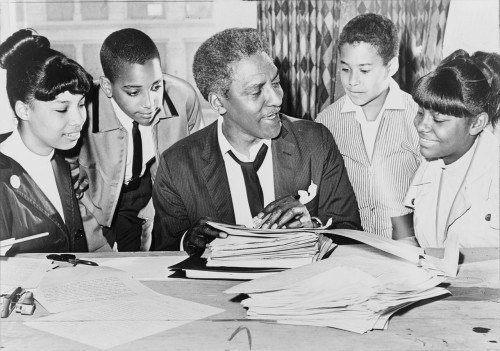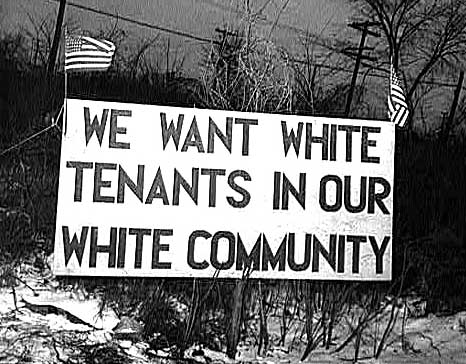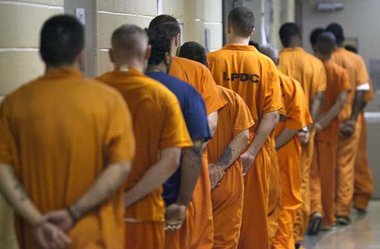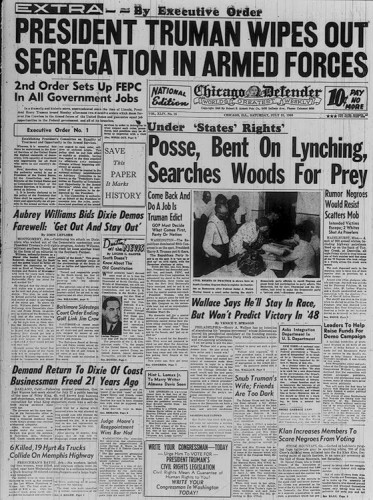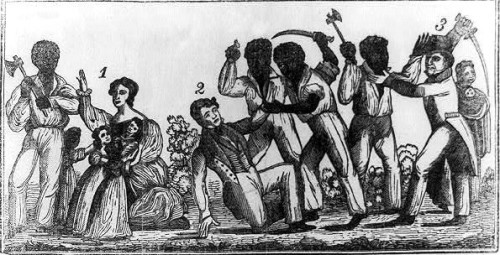Remembrance
Explore Our Online Exhibits
Breaking News
Worldwide Community Events
Week 4
- Sun 28
- Mon 29
- Tue 30
- Wed 1
- Thu 2
- Fri 3
- Sat 4
- Sun 5
- Mon 6
- Tue 7
- Wed 8
- Thu 9
- Fri 10
- Sat 11
- Sun 12
- Mon 13
- Tue 14
- Wed 15
- Thu 16
- Fri 17
- Sat 18
- Sun 19
- Mon 20
- Tue 21
- Wed 22
- Thu 23
- Fri 24
- Sat 25
- Sun 26
- Mon 27
- Tue 28
- Wed 29
- Thu 30
- Fri 31
- Sat 1
-
28April

New Orleans Jazz & Heritage Festival
Fair Ground Race Course, New Orleans28April














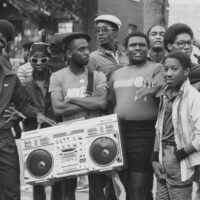
DYNAMIC RANGE: PHOTOGRAPHS BY BILL TENNESSEN
Haggerty Museum of Art28April

































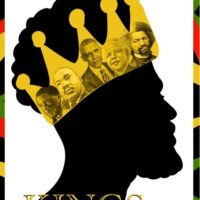 8:00 AM - 12:00 AM
8:00 AM - 12:00 AMDesere Mayo: History Through Art
Meadowridge Library28April







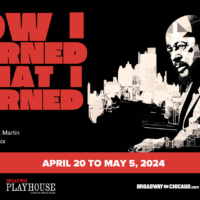 7:00 PM - 12:00 AM
7:00 PM - 12:00 AMHOW I LEARNED WHAT I LEARNED
Broadway Playhouse Chicago -
29April








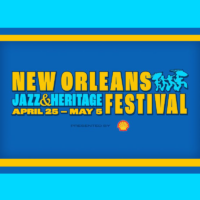
New Orleans Jazz & Heritage Festival
Fair Ground Race Course, New Orleans29April















DYNAMIC RANGE: PHOTOGRAPHS BY BILL TENNESSEN
Haggerty Museum of Art29April

































 All Day
All DayDesere Mayo: History Through Art
Meadowridge Library29April







 All Day
All DayHOW I LEARNED WHAT I LEARNED
Broadway Playhouse Chicago -
30April









New Orleans Jazz & Heritage Festival
Fair Ground Race Course, New Orleans30April















DYNAMIC RANGE: PHOTOGRAPHS BY BILL TENNESSEN
Haggerty Museum of Art30April

































 All Day
All DayDesere Mayo: History Through Art
Meadowridge Library30April







 All Day
All DayHOW I LEARNED WHAT I LEARNED
Broadway Playhouse Chicago -
01May









New Orleans Jazz & Heritage Festival
Fair Ground Race Course, New Orleans01May















DYNAMIC RANGE: PHOTOGRAPHS BY BILL TENNESSEN
Haggerty Museum of Art01May

































 All Day
All DayDesere Mayo: History Through Art
Meadowridge Library01May
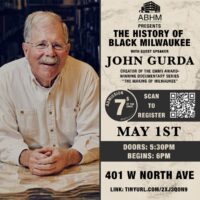 6:00 PM
6:00 PMHistory of Black Milwaukee Presented by John Gurda
ABHM in Milwaukee, WI01May







 All Day
All DayHOW I LEARNED WHAT I LEARNED
Broadway Playhouse Chicago -
02May









New Orleans Jazz & Heritage Festival
Fair Ground Race Course, New Orleans02May















DYNAMIC RANGE: PHOTOGRAPHS BY BILL TENNESSEN
Haggerty Museum of Art02May

































 All Day
All DayDesere Mayo: History Through Art
Meadowridge Library02May







 All Day
All DayHOW I LEARNED WHAT I LEARNED
Broadway Playhouse Chicago -
03May









New Orleans Jazz & Heritage Festival
Fair Ground Race Course, New Orleans03May















DYNAMIC RANGE: PHOTOGRAPHS BY BILL TENNESSEN
Haggerty Museum of Art03May

































 All Day
All DayDesere Mayo: History Through Art
Meadowridge Library03May
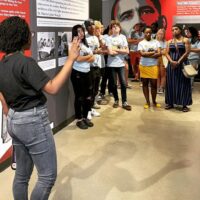
ABHM’s Jr Griot Program! Applications Due May 3rd
Virtual Event03May







 All Day
All DayHOW I LEARNED WHAT I LEARNED
Broadway Playhouse Chicago -
04May









New Orleans Jazz & Heritage Festival
Fair Ground Race Course, New Orleans04May















DYNAMIC RANGE: PHOTOGRAPHS BY BILL TENNESSEN
Haggerty Museum of Art04May

































 All Day
All DayDesere Mayo: History Through Art
Meadowridge Library04May
 9:00 AM - 2:00 PM
9:00 AM - 2:00 PMBlack Men in White Coats Youth Summit: Milwaukee
Golda Meir Upper Campus04May
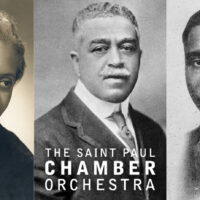 2:00 PM - 3:30 PM
2:00 PM - 3:30 PMCelebrating Black Composers Concert with the SPCO
Minnesota History Center04May







 All Day
All DayHOW I LEARNED WHAT I LEARNED
Broadway Playhouse Chicago -
05May









New Orleans Jazz & Heritage Festival
Fair Ground Race Course, New Orleans05May















DYNAMIC RANGE: PHOTOGRAPHS BY BILL TENNESSEN
Haggerty Museum of Art05May

































 All Day
All DayDesere Mayo: History Through Art
Meadowridge Library05May







 12:00 AM - 11:55 PM
12:00 AM - 11:55 PMHOW I LEARNED WHAT I LEARNED
Broadway Playhouse Chicago -
06May
















DYNAMIC RANGE: PHOTOGRAPHS BY BILL TENNESSEN
Haggerty Museum of Art06May

































 All Day
All DayDesere Mayo: History Through Art
Meadowridge Library -
07May

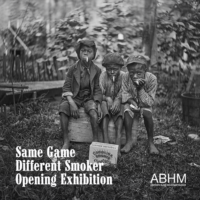 4:00 AM - 7:00 PM
4:00 AM - 7:00 PMSame Game Different Smoker Opening Exhibition
ABHM in Milwaukee, WI07May















DYNAMIC RANGE: PHOTOGRAPHS BY BILL TENNESSEN
Haggerty Museum of Art07May

































 All Day
All DayDesere Mayo: History Through Art
Meadowridge Library -
08May
















DYNAMIC RANGE: PHOTOGRAPHS BY BILL TENNESSEN
Haggerty Museum of Art08May

































 All Day
All DayDesere Mayo: History Through Art
Meadowridge Library -
09May
















DYNAMIC RANGE: PHOTOGRAPHS BY BILL TENNESSEN
Haggerty Museum of Art09May

































 All Day
All DayDesere Mayo: History Through Art
Meadowridge Library -
10May
















DYNAMIC RANGE: PHOTOGRAPHS BY BILL TENNESSEN
Haggerty Museum of Art10May

































 All Day
All DayDesere Mayo: History Through Art
Meadowridge Library -
11May
















DYNAMIC RANGE: PHOTOGRAPHS BY BILL TENNESSEN
Haggerty Museum of Art11May

































 All Day
All DayDesere Mayo: History Through Art
Meadowridge Library11May
 10:00 AM - 1:00 PM
10:00 AM - 1:00 PMBetty Brinn Children’s Museum Wonder Wagon
ABHM in Milwaukee, WI -
12May
















DYNAMIC RANGE: PHOTOGRAPHS BY BILL TENNESSEN
Haggerty Museum of Art12May

































 All Day
All DayDesere Mayo: History Through Art
Meadowridge Library -
13May


































 All Day
All DayDesere Mayo: History Through Art
Meadowridge Library -
14May


































 All Day
All DayDesere Mayo: History Through Art
Meadowridge Library -
15May


































 All Day
All DayDesere Mayo: History Through Art
Meadowridge Library -
16May


































 All Day
All DayDesere Mayo: History Through Art
Meadowridge Library -
17May


































 All Day
All DayDesere Mayo: History Through Art
Meadowridge Library -
18May


































 All Day
All DayDesere Mayo: History Through Art
Meadowridge Library -
19May


































 All Day
All DayDesere Mayo: History Through Art
Meadowridge Library -
20May


































 All Day
All DayDesere Mayo: History Through Art
Meadowridge Library20May
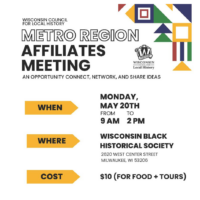 9:00 AM - 2:00 PM
9:00 AM - 2:00 PMWisconsin Historical Society’s Metropolitan Affiliates Meeting
Wisconsin Black Historical Society in MKE -
21May


































 All Day
All DayDesere Mayo: History Through Art
Meadowridge Library -
22May


































 All Day
All DayDesere Mayo: History Through Art
Meadowridge Library -
23May


































 All Day
All DayDesere Mayo: History Through Art
Meadowridge Library23May
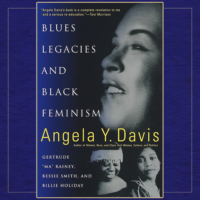 6:00 PM
6:00 PMABHM Book Club: Blues Legacies and Black Feminism by Angela Y Davis
Virtual Event -
24May


































 All Day
All DayDesere Mayo: History Through Art
Meadowridge Library -
25May


































 All Day
All DayDesere Mayo: History Through Art
Meadowridge Library25May

 8:00 AM - 12:00 AM
8:00 AM - 12:00 AMOHIO BLACK EXPO
Columbus, Ohio -
26May


































 All Day
All DayDesere Mayo: History Through Art
Meadowridge Library26May

 12:00 AM - 6:00 PM
12:00 AM - 6:00 PMOHIO BLACK EXPO
Columbus, Ohio -
27May


































 All Day
All DayDesere Mayo: History Through Art
Meadowridge Library -
28May


































 All Day
All DayDesere Mayo: History Through Art
Meadowridge Library -
29May


































 All Day
All DayDesere Mayo: History Through Art
Meadowridge Library -
30May


































 All Day
All DayDesere Mayo: History Through Art
Meadowridge Library -
31May


































 12:00 AM - 6:00 PM
12:00 AM - 6:00 PMDesere Mayo: History Through Art
Meadowridge Library -
01June

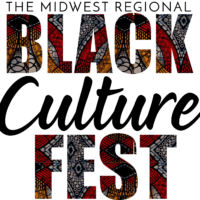 8:00 AM - 6:00 PM
8:00 AM - 6:00 PM2024 Midwest Regional Black Culture Fest
Washington Park
Share
"Remembrance" is one of America's Black Holocaust Museum's four themes, which serve as pillars in our virtual museum.
In every gallery, we remember important historical events and people who have played a role in civil rights or otherwise impacted the lives of Black Americans and others in the African diaspora. Some of these are well-known, but most are not. The stories told in most of ABHvM's exhibits have been left out of our history books or been told incompletely.
You will also notice how this theme appears in some events and breaking news articles, especially as new history comes to light or society finally treats certain subjects with respect.
On July 5, 1852, abolitionist and ex-slave Frederick Douglass gave this famously pointed speech at an event commemorating the signing of the Declaration of Independence. He told his white audience, “This Fourth of July is yours, not mine. You may rejoice, I must mourn.”
Read More About This TopicBernard Lafayette is one of the founding fathers of the Voting Rights Act. He was part of a small interracial army of men and women who presented their bodies as living sacrifices for the Act. Some lost their friends, their families, their minds — even their lives. But 50 years after their greatest triumph, their struggle is in danger of being lost.
Read More About This TopicHundreds gathered in a small town church in Abbeville, South Carolina, known as the the birthplace of the Confederacy. Descendants of Anthony Crawford and descendants of his lynchers joined in a service of apology, forgiveness and reconciliation for that lynching and other racial injustices that took place there nearly a century ago.
Read More About This TopicThe day after four little girls were murdered in church, a young white family man gave a speech about racism at a meeting of his Birmingham men’s club. He was to be forever shunned. This is what he said.
Read More About This TopicSome stories of the thousands of slaves who freed their families by escaping to Union lines. Why and how they came to settle and thrive in rural Wisconsin.
Read More About This TopicWhy haven’t more people heard about Bayard Rustin? Rustin organized sit-ins and freedom rides some twenty years before the 1960s Civil Rights Movement. He was the person who convinced Dr. King to use nonviolence in the Montgomery bus boycott, and he organized King’s 1963 March on Washington. Learn why Bayard Rustin remains an unsung hero despite his groundbreaking work over a long lifetime.
Read More About This TopicA sundown town is a community that for decades kept non-whites from living in it and was thus “all-white” on purpose. Sundown towns are rare in the South but common in the rest of the country. Learn why sundown cities, towns, suburbs, and neighborhoods developed–and how they continue to shape the lives and relationships of black and white Americans today.
Read More About This TopicThe War on Drugs that began in the 1980s has led to an explosive mass incarceration of African Americans. This exhibit examines how and why.
Read More About This TopicThis exhibit gives a short history of the black press, some of the important journalist involved, and the vital role it has played in advancing the ideals of American democracy and supporting African American identity and culture.
Read More About This TopicThis is the story of one of the largest rebellions by enslaved Africans in American history. It is also the story of historiography–how the past is researched, viewed, and written about.
Read More About This Topic- « Previous
- 1
- 2
- 3
- 4
- Next »












